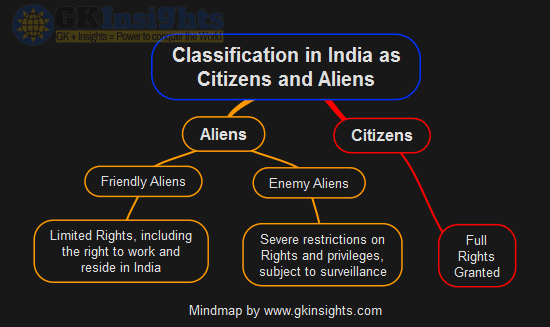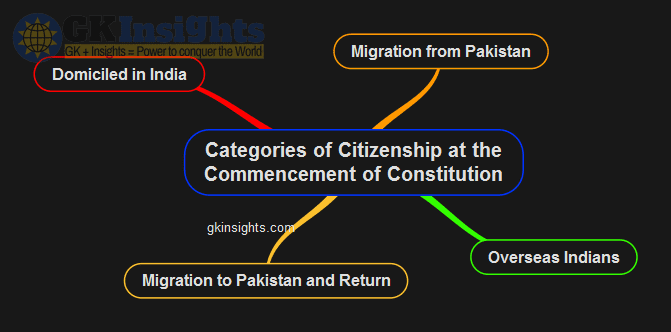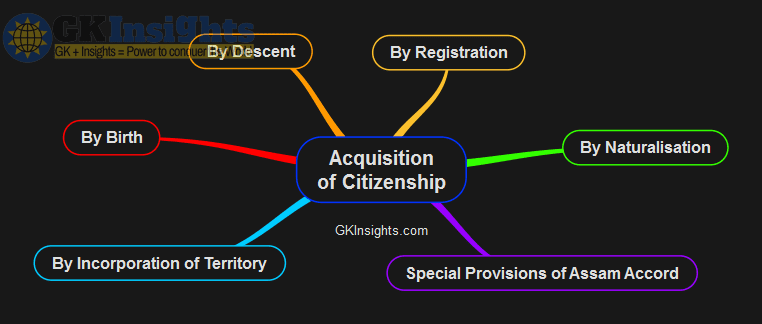
Citizenship
Citizens and Aliens

- India distinguishes between citizens and aliens.
- Citizens enjoy full rights and owe allegiance to India.
- Aliens are citizens of other countries with varying rights: friendly aliens (good relations with India) and enemy aliens (countries at war with India, fewer rights).
- Rights granted only to Citizens of India (& not to Aliens): Articles 15, 16, 19, 29, 30
Constitutional Provisions
Articles 5 to 11
- Citizenship governed by Articles 5 to 11 in Part II of the Constitution.
- Constitution identifies citizens at its commencement (January 26, 1950) but lacks comprehensive provisions on acquisition and loss of citizenship.
- Parliament has the authority to enact laws regarding citizenship matters.
- The Citizenship Act (1955) was enacted by Parliament and has been amended over time.
Categories at Commencement
Following 4 categories of persons became citizens of India at the commencement of its Constitution on January 26, 1950

Domiciled in India
- Individuals with domicile in India and specific conditions (birth in India, parent’s birth in India, or five years’ residence) became citizens at the Constitution’s commencement.
Migration from Pakistan
- Those who migrated from Pakistan to India became citizens if they or their parents/grandparents were born in undivided India.
- Conditions for those who migrated before and after July 19, 1948.
Migration to Pakistan and Return
- Individuals who migrated to Pakistan from India after March 1, 1947, and later returned could become Indian citizens.
- Required six months of residence in India before applying for registration.
Overseas Indians
- Persons of Indian origin residing outside India can become Indian citizens by registration with the diplomatic or consular representative of India in their country of residence.
- Covers the overseas Indian diaspora who wish to acquire Indian citizenship.
Other Consitutional Provisions
Voluntary Acquisition of Foreign Citizenship
- Article 09: No person can be an Indian citizen if they voluntarily acquire the citizenship of another foreign state.
Continuation of Citizenship
- Article 10: Every person who is or is deemed to be a citizen of India shall continue to be a citizen, subject to the provisions of any law made by Parliament.
Parliament’s Authority
- Article 11: Parliament has the power to make provisions regarding the acquisition and termination of citizenship and all other matters relating to citizenship.
Citizenship Act, 1955
Introduction
- The Citizenship Act (1955) governs post-constitution commencement acquisition and loss of citizenship.
- Initially included provisions for Commonwealth Citizenship, later repealed by the Citizenship (Amendment) Act, 2003.
Acquisition of Citizenship

- The Act outlines five methods of acquiring citizenship: birth, descent, registration, naturalization, incorporation of territory, and special provisions
1. By Birth
- Individuals born in India before specific dates acquire citizenship based on their parents’ nationality.
- For those born:
- On or after January 26, 1950, but before July 1, 1987: Citizenship by birth, regardless of parental nationality.
- On or after July 1, 1987: Citizenship by birth if at least one parent is an Indian citizen at the time of birth.
- On or after December 3, 2004: Citizenship by birth if both parents are Indian citizens or one parent is an Indian citizen, and the other is not an illegal migrant at the time of their birth.
- Children of foreign diplomats posted in India and enemy aliens cannot acquire Indian citizenship by birth.
2. By Descent
- Individuals born outside India can acquire citizenship based on their father’s citizenship.
- For those born:
- On or after January 26, 1950, but before December 10, 1992: Citizenship by descent if the father was an Indian citizen at the time of their birth.
- On or after December 10, 1992: Citizenship by descent if at least one parent is an Indian citizen at the time of their birth.
- After December 3, 2004: Citizenship by descent requires birth registration at an Indian consulate within one year of birth, with an undertaking that the child doesn’t hold another country’s passport.
- Dual citizens must renounce other citizenship within six months of attaining full age.
3. By Registration
- The Central Government may register any person as a citizen of India under several categories, including:
- Persons of Indian origin residing in India for seven years.
- Persons of Indian origin residing outside undivided India.
- Spouses of Indian citizens residing in India for seven years.
- Minor children of Indian citizens.
- Persons whose parents are registered Indian citizens.
- Persons who or whose parents were citizens of independent India, residing in India for twelve months before applying.
- Overseas Indian cardholders residing in India for twelve months before applying.
- A person is considered of Indian origin if they or their parents were born in undivided India or in territories that became part of India after August 15, 1947.
- Oath of allegiance is required for registration.
4. By Naturalization
- The Central Government may grant naturalization if specific qualifications are met:
- Not a subject or citizen of a country preventing Indians from becoming subjects or citizens.
- Undertaking to renounce other citizenship.
- Residency or service in India for specified periods.
- Good character, language knowledge, and intent to reside in India.
- Waivers may apply for distinguished service to India.
- Naturalized citizens must take an oath of allegiance to the Indian Constitution.
5. By Incorporation of Territory
- When foreign territories become part of India, the government specifies who becomes Indian citizens.
- For example, when Pondicherry became a part of India, the Government of India issued the Citizenship (Pondicherry) Order (1962), under the Citizenship Act (1955).
6. Special Provisions (Assam Accord)
- The Citizenship (Amendment) Act, 1985, introduced special provisions for persons covered by the Assam Accord.
- Provided a path to citizenship for those who came to Assam from Bangladesh before specific dates.
Loss of Citizenship
- The Citizenship Act (1955) outlines three ways of losing citizenship: renunciation, termination, and deprivation.
1. By Renunciation
- Any citizen of India can renounce citizenship, ceasing to be an Indian citizen.
- Exceptions apply during wartime.
2. By Termination
- Voluntarily acquiring another country’s citizenship automatically terminates Indian citizenship, except during wartime.
3. By Deprivation
- Central government can forcibly terminate citizenship under specific circumstances, including fraud, disloyalty, unlawful activities during wartime, imprisonment in another country, or extended residence abroad.
Single Citizenship
Introduction
- India’s federal constitution features a dual polity with the Centre and states.
- India, unlike countries like the USA and Switzerland, has a single citizenship – Indian citizenship.
- This means that citizens in India owe allegiance only to the Union, and there is no separate state citizenship.
Comparison with Dual Citizenship
- In the USA, individuals are both citizens of the nation and the particular state they belong to, leading to dual sets of rights.
- This dual citizenship system can create discrimination issues, where states favor their citizens in various matters like voting rights, holding public offices, and professional practice.
Single Citizenship in India
- In India, all citizens, regardless of their birthplace or residence within the country, enjoy the same political and civil rights throughout India without discrimination.
- However, some exceptions exist:
1. Parliamentary Prescribed Residence
- Parliament, under Article 16, can mandate residence within a state or union territory as a condition for certain employments or appointments.
- The Public Employment (Requirement as to Residence) Act, 1957, once authorized the government to prescribe residential qualifications for non-Gazetted posts in specific states.
2. Discrimination on Grounds Other Than Residence
- Article 15 of the Constitution prohibits discrimination against any citizen based on religion, race, caste, sex, or place of birth but not on residence.
- States can provide special benefits or preferences to their residents in areas not covered by constitutional rights.
3. Protection of Tribal Interests
- Article 19, governing freedom of movement and residence, allows restrictions to protect the interests of scheduled tribes.
- This limitation safeguards tribal culture, language, customs, and property from external exploitation.
4. Special Provisions for Jammu and Kashmir (Repealed)
- Until 2019, Jammu and Kashmir’s legislature had special powers to define permanent residents and grant them specific rights and privileges.
- Article 35-A, inserted via a 1954 Oder under Article 370” conferred these powers.
- In 2019, Jammu and Kashmir’s special status was abolished by “The Constitution (Application to Jammu and Kashmir) Order, 2019.”
Overseas Citizenship of India (OCI)
Background
- In 2000, the Indian government established a High-Level Committee on the Indian Diaspora to study the global Indian Diaspora and recommend measures for a constructive relationship with them.
OCI Creation
- The Citizenship (Amendment) Act, 2003, amended the Citizenship Act (1955) to introduce Overseas Citizenship of India (OCI) for Persons of Indian Origin (PIOs) from 16 specified countries (excluding Pakistan and Bangladesh).
- It removed provisions recognizing Commonwealth Citizenship.
Expansion of OCI
- The Citizenship (Amendment) Act, 2005, extended OCI to PIOs of all countries (except Pakistan and Bangladesh) if their home countries allowed dual citizenship.
- Note: OCI is not dual citizenship, as the Indian Constitution prohibits it.
Introduction of OCI Cardholder
- The Citizenship (Amendment) Act, 2015, merged the PIO card and OCI card schemes into a single “Overseas Citizen of India Cardholder” scheme.
- PIO card scheme started in 2002, followed by the OCI card scheme in 2005.
- The merger aimed to reduce confusion among applicants.
- Existing PIO cardholders were automatically considered OCI cardholders from January 9, 2015.
OCI Cardholder Rights and Restrictions
Registration of Overseas Citizen of India Cardholder:
- The Central Government may register individuals as OCI cardholders if they meet specific criteria.
- Eligible individuals include foreign citizens with Indian connections, spouses of Indian citizens, and minors with Indian citizen parents.
- Those with ties to Pakistan, Bangladesh, or other specified countries are ineligible.
- Special circumstances can lead to registration, determined by the Central Government.
Conferment of Rights on Overseas Citizen of India Cardholder:
- OCI cardholders are entitled to specific rights defined by the Central Government.
- However, they are not entitled to certain rights held by Indian citizens, including:
- Right to equality of opportunity in public employment.
- Eligibility for presidential or vice-presidential elections.
- Appointment as a Judge of the Supreme Court or High Court.
- Voter registration.
- Membership in the House of the People, Council of States, State Legislative Assembly, or State Legislative Council.
- Certain public service and post appointments.
Renunciation of OCI:
- OCI cardholders can renounce their OCI status through prescribed procedures.
- Renunciation results in the individual ceasing to be an OCI cardholder.
Cancellation of Registration as OCI Cardholder:
- The Central Government may cancel OCI registration under various circumstances, including:
- Fraudulent registration.
- Disaffection towards the Indian Constitution.
- Unlawful activities during wartime.
- Imprisonment of two years or more within five years of registration.
- National interests, sovereignty, integrity, security, or public interest.
